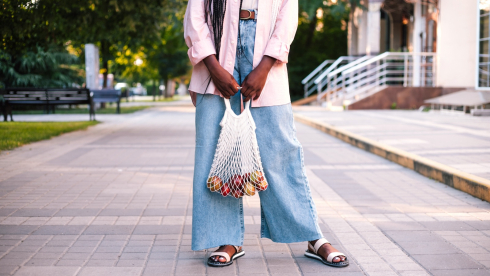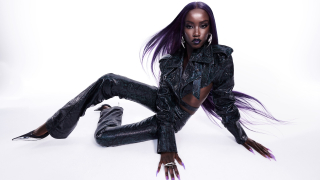There’s been a lot of vintage vision lately when it comes to the Jazz Age of Harlem USA. Last year, former Time-Warner CEO Richard Parsons reopened Minton’s Playhouse—the illustrious bar-restaurant where Thelonious Monk, Charlie Parker and Dizzy Gillespie held court in the 1940s. The Apollo Theater recently tapped tap-dance legend Maurice Hines, Boardwalk Empire’s Margot B. and others to recreate the Cotton Club days of old in a special Apollo Club Harlem program. But to truly slip back in time to the Duke Ellington Orchestra days of big bands, high-style (pre-ghetto) fabulousness and dance dance dance, look no further than the mind-blowing Broadway musical, After Midnight.
The Jazz at Lincoln Center All Stars—a 17-piece band handpicked by Wynton Marsalis—swings and burns and solos throughout the 90-minute show, while host Dulé Hill manages an eclectic collection of singers, tap-dancers and starring guests. (Fantasia was featured for months, followed by k.d. lang, then Toni Braxton with Babyface. Vanessa Williams currently stars ’til May 11 and Fantasia’s return.) Classics like “Stormy Weather” and “I Can’t Give You Anything but Love” are star turns par excellence, and Fantasia nailed them both when I saw After Midnight. But this is hardly a musical hinged solely on its star turns.
RELATED: WYNTON MARSALIS TOOTS HIS OWN HORN [INTERVIEW]
I first discovered Duke Ellington’s transcendent “Creole Love Call”—with its heavenly, operatic coloratura from singer Adelaide Hall—some years back during director Ken Burns’s Jazz miniseries. This gem has nowhere near the mass popularity of Ellington hits like “Take the ‘A’ Train,” “In a Sentimental Mood” or “It Don’t Mean a Thing (If It Ain’t Got That Swing).” So when Carmen Ruby Floyd began to belt out the song an hour into After Midnight, in a comedic version served with just as much acting as singing, I froze, transfixed with goosebumps. That was the musical’s highlight for me, totally unrelated to its rotating, illustrious guest stars.
The whole point of After Midnight is to expressly celebrate Duke Ellington’s band-leading days at the Cotton Club, the notorious Whites-only, Prohibition-era nightclub where jazz reigned. (Legends like Louis Armstrong, Count Basie, Cab Calloway, Lena Horne, Ella Fitzgerald, Billie Holiday and Nat King Cole were regulars.) Lacking a central plot, it’s hard to know what to expect from this musical revue, but it quickly sucks you in as each performance builds on the next.
Singer-actress Adriane Lenox kills “Women Be Wise,” as she admonishes ladies to keep their sex lives to themselves before their men get scooped up and away (possibly by her). “Diga Diga Doo” is full of scatty, doo-wop-ish acrobatics from Everett Bradley, Cedric Neal, T. Oliver Reid and Monroe Kent III. Hiphop’s break-dancing battles have nothing on dancers Julius “iGlide” Chisolm and Virgil “Lil’ O” Gadson, playfully going toe to toe during “Hottentot” with Nicholas Brothers swag. And “Zaz Zuh Zaz” is a call-and-response, Cab Calloway classic in his “Minnie the Moocher” tradition, led by Vanessa Williams but powered by the audience of the Brooks Atkinson Theatre and the Jazz at Lincoln Center All Stars band. It kills.
At this current Broadway moment of Motown: The Musical, A Raisin in the Sun and the forthcoming Tupac Shakur-inspired Holler if Ya Hear Me, the African-American experience can be sampled from many different angles. But After Midnight stands as tall as anything else; it’s not to be missed.
Miles Marshall Lewis is the Arts & Culture Editor of EBONY.com. He’s also the Harlem-based author of Scars of the Soul Are Why Kids Wear Bandages When They Don’t Have Bruises, There’s a Riot Goin’ On and Irrésistible. Follow MML on Twitter at @furthermucker, and visit his personal blog, Furthermucker.













